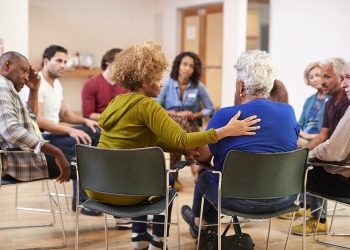So much can go wrong during your first months of addiction recovery, with everything so fresh and new and finding yourself often inundated with raw emotions and painful situations you feel ill-equipped to deal with yet. It is one thing to have a bit of relapse prevention training under your belt from your days during treatment, but it is another thing altogether to really put those skills to practice in the real world. Suddenly, what you learned seems foreign and too difficult to follow. Most of all, you feel a great sense of uncertainty and anxiety about making the right choices for your addiction healing process. Furthermore, you do not have the structure and schedule that you lived with during your active treatment phase, especially if you went to a residential treatment facility. Now, you are all on your own, and it is often a scary and frightening place to be.
First things first, get yourself to a 12-step meeting. This is the one constant and ongoing support network that you have readily available to you. It does not matter where you are in the United States; there is likely one or more 12-step groups meeting in your area. There are even 12-step groups meeting regularly in numerous foreign countries and U.S. territories. You also do not have to physically be in the room to participate, although in-person, in-the-room networking is always the best. Most 12-step fellowships offer online and teleconference meetings for those who cannot make it to a meeting location or need emergency assistance in the form of instant meetings.
Whether you attended a residential addiction treatment program or got treatment on an outpatient basis, no doubt there were significant costs involved. Some addicts who feel they cannot afford treatment, either because they do not have insurance or insurance does not cover treatment or because of family hardship, go to 12-step meetings to at least get some idea of how recovery works. While no treatment occurs at meetings, the fellowship is very supportive. Best of all, the meetings do not cost anything. The only requirements to joining are a genuine commitment to maintaining sobriety and helping others do the same.
The addiction healing process is unique for everyone. Some seem to take to it naturally, while others struggle and slip again and again until they finally seem to get into the process. Understandably, there are bound to be conflicts that arise. When people get emotional, sometimes they say things that others may find objectionable or harsh. It is not that they mean to, but all that pent-up emotion and frustration and guilt and shame and rejection that someone feels has to come out somehow. Avoid taking anything personally. If you find that a conflict emerges with another meeting attendee, try to remain calm. You may wish to alternate your attendance at that meeting to days and times when the individual does not attend or change meetings. There is nothing that says you are going to always like everyone in attendance in the rooms. That is just highly unlikely. But what is true is that potential conflicts can be nipped in the bud. Always take the higher ground. And, if you inadvertently say something you wish you had not, be upfront and apologize to the individual and/or the group as soon as possible.














